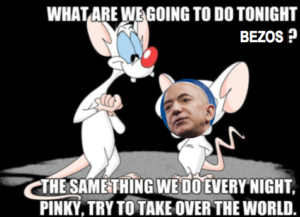Busines & Money

Uber is dead in the water. The news of the Google + Lyft Partnership has to be the most devastating blow imaginable. Let’s lay out the reasons.
First off, let’s quickly define a couple terms. When it comes to innovation (as per Clayton Christiansen), you have two types: disruptive and sustaining. Disruptive innovation comes with not only a massive technological improvement, but more importantly a brand new business model. The innovator has thought up an entirely new way to go to market. On the other hand, while sustaining innovation also comes with technological improvement, it fits into the existing business model. It simply makes the existing advantages more powerful.
Up until now, I believe Uber has been in the lead due to their disruptive innovation in transportation. That innovation hasn’t been the technology itself (as shown by all the copy cats in ride sharing), but instead the business model. They have applied network effects to transportation and completely flipped the idea of car ownership on its head. 🍌🍌🍌🍌!!! It’s now more economical to use a ride-sharing service in many instances than it is to own a car. With more drivers on the road, wait times for passengers decrease. With more riders, more drivers are incentivized to come on line. It’s the perfect fly wheel! To boot, the company gathers more and more data as they handle more trips, thus allowing them to better optimize the entire system.
Now when considering the technology itself, that is the autonomous vehicle (AV) technology that takes ride sharing to the next level, Uber has not been in the lead. It is no secret that Google has been working on AV tech for a decade and a half. As a result, Google has an insane lead with regards to improving and iterating on the technology. For Uber, trying to compete with Google head to head on technology seems like a losing proposition. What they should have done is partnered with Google. Uber’s network + Google’s technology would have been an unbeatable combination. And it almost happened. Google Ventures invested $258,000,000 in Uber back in 2013 which seemingly put the two in bed together.
But now Google is suing Uber over the alleged theft of Google IP. On other words, the relationship has soured. In response, Uber has partnered with Lyft and delivered what could be the fatal blow to Uber. Google’s tech now has a clear go-to-market strategy via Lyft’s network. The only way Uber can win now is to get to market first with a viable AV. I wouldn’t hold your breath.
Human Progress
A couple months back I wrote about digital security and how you can protect yourself. I left out one key recommendation: BACK EVERYTHING UP! (I actually don’t store much of anything on my hard drive these days. I have both Dropbox and Google Drive downloaded so that whenever I save a file, it is automatically stored in one of these services)
Now we find ourselves here in the midst of one of the worst ransomware attacks in history.
So what happened/is happening? Over the weekend a few hundred thousand computers were infected with “WannaCry” ransomeware.
What is ransomware? Basically, someone will accidentally run malicious code on their computer, perhaps from downloading a sketchy attachment. Once the code (called “ransomware”) runs, some or all of the files on the hard drive are encrypted. The program then demands a ransom in exchange for decrypting the files. if the user doesn’t pay by a certain date, the files are lost forever.
In the case of WannaCry, the 7-day deadline hasn’t yet passed, so it is yet to be determined if the attackers will actually follow through on the threat.
There are a couple other points here that make this attack especially 🍌🍌🍌🍌.
First, WannaCry is particularly malicious in that it doesn’t need to downloaded by multiple users within a network. If, for example, one person at your company downloads it, the attack can spread on its own to other users in the network.
Secondly, WannaCry takes advantage of an exploit called EternalBlue which seems to have originated from the NSA. Apparently the NSA is stockpiling exploits (I’d imagine so that they could use them for spying purposes if/when necessary) rather than notifying software providers so that vulnerabilities can be fixed. Looks like that one back fired!
So what can you do?
Again, back up your files! Also, don’t download sketchy attachments. If it makes you double take for even a second, don’t bother. Third, install regular software updates. I know these can be annoying and seemingly always popup at inconvenient times, but software publishers are constantly pushing updates to fix problems so things like the WannaCry attack can’t happen. (I’m updating both iPhones as we speak).
Philosophy
I was recently talking to a friend about how to keep oneself intellectually honest. Here’s the suggestion that they gave. “When you come across a view point that you disagree with, seek out 2-3 other sources that confirm that viewpoint.” It might not be practical to do this for every single thing you disagree with in life, but I think it’s a fantastic suggestion when it comes to big important things.
One example I can think of is North Korea. Pretty much everything that comes from the media about North Korea paints the country in a pretty bad light. And perhaps for good reason. But after seeing so much negative publicity about the country, I thought it couldn’t hurt to look for information that confirms the opposite perspective. One example I found was this article on Medium. And to be quite honest, the article makes a lot of sense.
And none of this is to say that your mind should necessarily be changed about any specific subject. I still sit clearly on the side of liberal democracy over soviet-style communism. But understanding a bit more information about the historical backdrop and understanding the perspective of others allows for more informed and constructive conversations.
My Latest Discovery
I recently discovered a great way to improve my interpersonal skills. It happened at the gym a couple weeks ago doing a cardio session on the bike. I couldn’t get the volume on the TV to work so I was forced to watch on mute. Instead of giving up on the TV and just listening to music, I decided to focus on the silent interview in front of me to try and pick up on the nonverbal cues of conversation. It was fascinating! The way people sit, how often they shift their weight, what they do with their hands while speaking… There was so much information to be gleaned.
So much of life involves interacting with other people. And so much of communicating with other people happens outside of what’s being said. I think I’ll adopt this practice of watching mute videos more often as practice for being more attentive to nonverbal signals.

